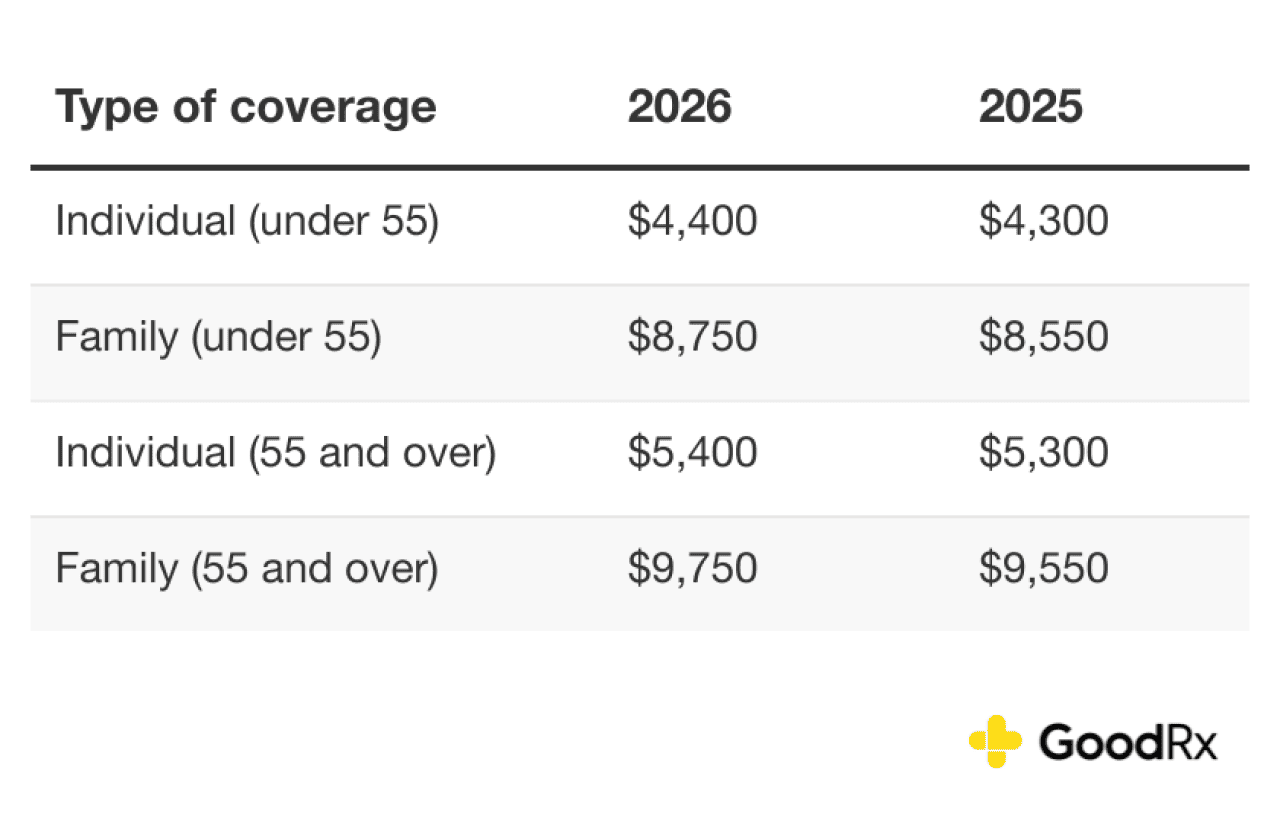Self-employed individuals, such as small business owners and independent contractors, are always looking for ways to lower their tax bill and better manage healthcare costs. An often overlooked option among many new entrepreneurs health savings account (HSA).
An HSA is a tax-advantaged account that allows you to pay for qualified medical expenses, such as certain vision care and: dental servicesin dollars without taxes. Unlike a flexible spending account (FSA), which is sponsored and managed by an employer, you can set up and manage your own HSA even if you are self-employed. GoodRx:drug savings platform, shares important considerations to keep in mind before opening an HSA on your own.
Basic means.
- You can open a health savings account (HSA) as a self-employed freelancer or business owner if you have a qualified high-deductible health plan.
- An HSA can help self-employed individuals save money on health care expenses such as reading glasses and over-the-counter medications.
- Make sure you understand the HSA rules before opening an account.
Can a self-employed person have an HSA?
Yes! A self-employed individual may be eligible for an HSA if they qualify high deductible health plan (HDHP). This includes Instacart shoppers, freelancers, Uber drivers and small business owners. You do not need to have an employer or a full-time job to be eligible for an HSA.
What are the requirements to open an HSA?
There are a few rules that self-employed individuals should be aware of before opening an HSA. First, you must have a qualified HDHP. Your health insurance plan must meet annual spending limits and minimum deductibles. These plans usually come higher deductibles and lower monthly premiums than other types of coverage.
If your HDHP qualifies, you’ll need to make sure you meet other requirements. Here are some of them HSA Eligibility According to the Internal Revenue Service:
- You do not have health insurance other than certain neglected coveragelike dental and vision insurance.
- Registered individuals Medicare are not allowed contribute to an HSA.
- People dependent on someone else’s return may not take the deduction.
- You have HDHP coverage on the first day of the last month of the year to meet last month rule. This is December 1st for many self-employed individuals whose insurance plan year often starts on January 1st.
Beginning January 1, 2026, the eligibility rules for health savings accounts (HSAs) will expand. According to the One Big Beautiful Bill Act (OBBBA), bronze and catastrophic The Affordable Care Act (ACA) marketplace plans will be reclassified as qualifying HDHPs. This change will make it easier for more self-employed individuals to take advantage of the tax benefits of an HSA without switching to a traditional HDHP.
How do you open an HSA?
If you meet the qualifications to open an HSA, you’ll need to find a custodian or administrator. This can be a bank, credit union, insurance company, or an IRS-approved intermediary. There are several things to consider when opening an account.
- What are the management fees?
- Is there a minimum dollar amount to open an account?
- Are there investment options?
- Do I need a minimum account balance to be able to invest my funds?
- How much are the investment fees?
- Will I get a debit card or do I need to submit receipts for reimbursement?
As a sole proprietor, you will not have an employer to contribute or reimburse administrative fees on your behalf. Do your research and ask the right questions to make sure an HSA meets your needs. You can compare HSA providers online to help you make the best decision.
Sole proprietors versus traditional workers
HSA qualifications for a traditional employee and a sole proprietor are the same. But there can be a difference in investing in the account.
Traditionally, an employee tells their employer how much they would like to contribute to their HSA. An employer can also contribute money to increase employee benefits. The amount contributed by the employer and the employee must not exceed the annual limits. The payroll department will take money out of your paycheck to fund the HSA. This is called a pre-tax payment. Employees can contribute money to their HSA before their income is taxed. This can lower your taxable income and save you money at tax time.
Being an entrepreneur can provide more freedom, but it also comes with more responsibility. A sole proprietor must set up their own HSA contributions. You can transfer money from your checking account to your HSA whenever you want. Many self-employed individuals make after-tax contributions to fund their HSA. This makes it possible claim a deduction when you file your tax return.
How much can I contribute to my HSA?
Your HSA contribution limits depend on whether your health plan has individual or family coverage. Other variables that affect how much can you contribute? are
- your age If you are 55 or older, you can contribute an additional $1,000 to your account.
- The date you become an eligible individual. If you are eligible to make HSA contributions before December 1st, you may be eligible to contribute the maximum amount based on the last month rule.
- The date you cease to be an eligible individual. You can’t make deductible payments for any month you don’t meet the HSA requirements.
It investment limits in 2025 $4,300 for individual HSA plans and $8,550 for a family plan. If you are 55 or older at the end of the tax year, you are eligible to contribute up to $1,000. You have until next year’s tax deadline to make your contribution. That means you can contribute to a 2025 HSA until April 15, 2026, unless the tax filing deadline changes.
Here are the maximum HSA contribution limits for 2025 and 2026:

What are the benefits of having a health savings account if you are self-employed?
An HSA is a financial tool that you have, saves you money and provides tax benefits. Here are some additional benefits that can be useful for self-employed individuals:
- Deposits stay in your account until you use them.
- You are not required to donate a minimum amount.
- You can invest the funds.
- You can use funds for qualified medical expenses.
Unlike a flexible spending accountwhich requires you to use or lose the money you save, your HSA dollars roll over each year until you use them. You will not be penalized if you do not deposit into your account. There is no minimum contribution each year, but there is a limit on the amount you can make. You can get the most out of your HSA contributions by investing your money. As your money grows, you’ll have more money to fund future medical expenses.
An HSA pairs well with HDHP coverage because it covers qualified expenses you incur before your deductible is met. This includes, but is not limited to:
For a complete list of qualified expenses, check IRS Publication 502. It CARES Act: added over the counter medication and: menstrual products to the list.
What are the downsides of an HSA?
The benefits of an HSA only come if you don’t know how to take full advantage of them. Here are some potential downsides you should consider, including:
- Insurance plan requirements. Only individuals enrolled in a qualified HDHP can contribute to an HSA. With this type of plan, you must pay out-of-pocket for your health care costs until you reach your deductible, which can be thousands of dollars.
- Annual investment limits. There is a limit to how much you can contribute to an HSA each year. If you contribute beyond the limits, you may face a 6% overpayment penalty.
- Expenditure restrictions. Your HSA is used to pay for qualified medical expenses. If you spend your HSA dollars on non-qualified expenses, you’ll owe income tax on the distribution. You will also be fined if you are under 65.
- Investment risks. If you invest the funds in your HSA, your investment may lose value if market conditions are not favorable.
- Account fees. Depending on your HSA provider, you may pay for services such as account maintenance, investments, transactions, and paper statements.
- Noncompliance with Medicare. You can no longer contribute to an HSA after you enroll in Medicare. But you’ll still be able to use your account funds to pay for qualified medical expenses.
Bottom line:
Self-employed individuals can contribute money to an HSA and use the funds to pay for qualified medical expenses. If you want to open an account, make sure you have a qualifying health plan and understand the HSA rules. You should also inquire about account requirements to make sure you don’t incur any unexpected charges. An HSA can be very useful for self-employed individuals, but it’s important to do your research to determine if it’s the best account for your needs.
This story was produced GoodRx: and revised and distributed Stacker.
RELATED CONTENT: Venus Williams wins in the name of health insurance






